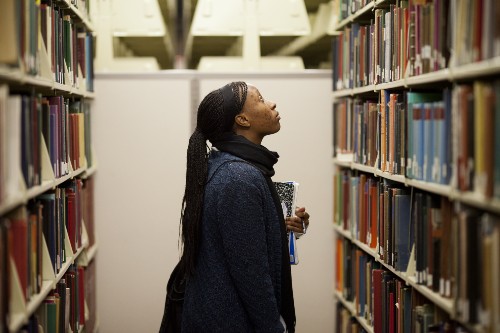By: Diane Detournay
Reading Group Participant
Lecturer, English and Women’s, Gender and Sexuality Studies

In a semester marked by the radical unsettling of higher education’s foundational infrastructure, members of the ReIMAGINE Reading Group reflected at the last meeting on how the reading and discussions it shared together, prepared everyone for the immense challenges of this time in unexpected ways. While we could not have anticipated the abrupt closure of our classrooms and the loss of the familiar conditions that structure teaching and learning, our efforts to expansively “reimagine” undergraduate education to better serve our students suddenly and urgently needed to be put into practice. As one member of our group eloquently put it, “all of a sudden the future we were talking and reading about was here.”
Although conversations about the current state of higher education tend to cast the coronavirus as the source of the crisis and as the principal force to contend with, the work of the Reading Group points us towards a different framing, which I also see opening up spaces of possibility. Along these lines, the pandemic is best understood not as a discrete event that precipitates marginalization or as itself the agent of harm, but rather as that which exposes and amplifies a set of already existing crises at the site of the university. For example, we grappled with a range of issues prior to the online transition ranging from the student debt crisis, the inadequate support for universal design, the deprofessionalization of teaching, the casualization of academic labor, the disjuncture between disciplinary training and the demands of the job market, issues pertaining to diversity, and the intensification of inequalities pertaining to college preparedness.
The Reading Group also reflected on how the stories that we share regarding the founding and mission of the university deeply shape the ways in which we apprehend these problems and our potential imagining of the future. The words of Katheryn Yusoff resonate here: “…nothing that can be found in the end is not already prefigured in the origin. Origins configure and prefigure the possibility of narratives of the present.”
As a result, I return to the collective insights from the Reading Group at this critical juncture when we are working to creatively stretch the potentialities contained within the hybrid flex model as far as they can possibly go. Amidst the ongoing tragedy and its ruins, the pandemic has also provided a clearing to seize these struggles as the defining condition of higher education. The ReIMAGINE Reading Group has compelled me to challenge the predominant framing of the pandemic as a crisis that has disrupted a status quo and as one that primarily demands medical, technological, and scientific management. Rather, perhaps we understand this moment as one that offers us the opening and opportunity to imagine a future world from an origin marked by crisis.
